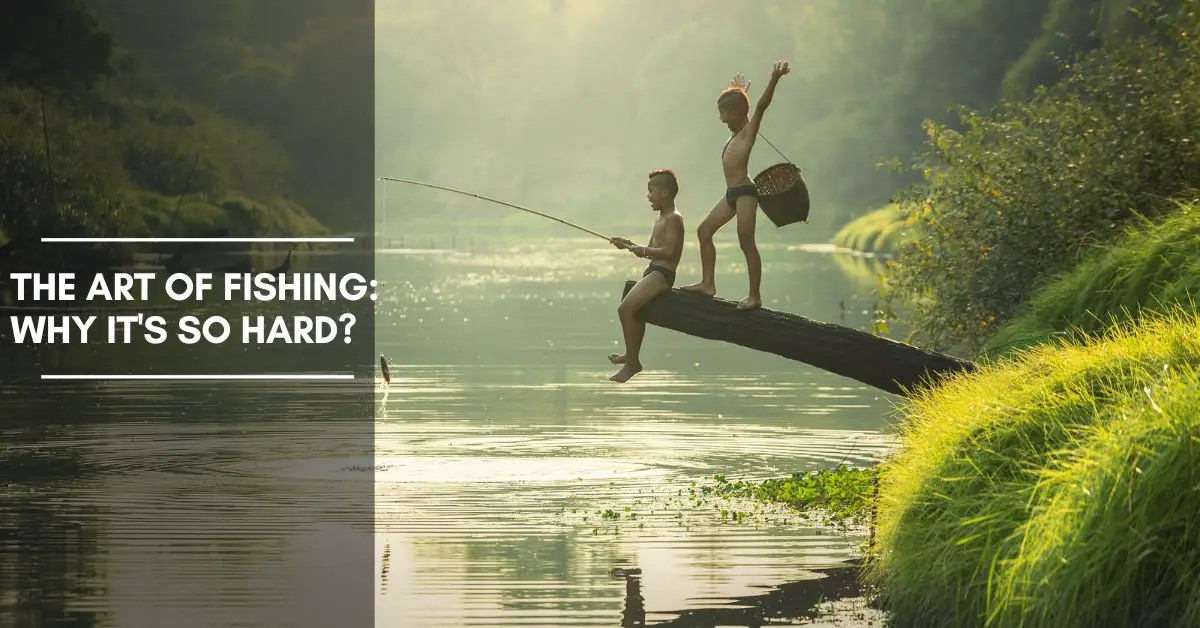As a passionate angler, I’ve often found myself pondering the question of why fishing is so hard. In this article, I’ll dive into the intricacies of the sport, exploring the various factors that make fishing such a challenging and rewarding pursuit.
From mastering techniques to understanding fish behavior, we’ll cover all the bases to help you gain a better understanding of the complexities of fishing.
in short, fishing is hard because it requires a blend of skill, knowledge, patience, and the ability to adapt to ever-changing conditions. With so many variables at play, it’s no wonder that even seasoned anglers face difficulties when trying to reel in their catch.
But fear not, fellow fishing enthusiasts 🙂 In this guide, I’ll break down the challenges of fishing, offer tips on how to overcome them, and help you unlock the secrets of this captivating sport. So grab your tackle box, and let’s get started.
The Unpredictable Nature of Fish
Fish Behavior
Understanding fish behavior is crucial for any angler. However, fish can be unpredictable, making it difficult to determine where they’ll be or what they’ll be biting on at any given time. Factors like water temperature, weather conditions, and food availability all play a part in shaping fish behavior.
The Role of Instinct
Fish rely heavily on their instincts, which can be difficult for humans to understand and anticipate. For instance, fish are known to be skittish and may abandon an area if they sense a threat, like the presence of a predator or the slightest movement from an angler.
Adapting to Conditions
To increase your chances of success, pay close attention to the environment and adjust your tactics accordingly. This may mean switching up the bait, changing fishing locations, or trying different techniques.
The Importance of Skill and Technique
Mastering the Basics
Fishing requires a solid foundation of skills, like casting, knot-tying, and handling your gear. These skills take time and practice to develop, and even experienced anglers can find room for improvement.
Advanced Techniques
Beyond the basics, there are numerous advanced techniques to learn, such as fly fishing, jigging, or trolling. Each method requires its own unique set of skills and can take years to master.
Fine-Tuning Your Approach
The key to getting better at fishing is continuous learning and refining your techniques. This includes analyzing your successes and failures, researching new methods, and staying up-to-date on the latest gear and technology.
The Role of Patience and Persistence
Playing the Waiting Game
One of the hardest aspects of fishing is the need for patience. Waiting for a bite can take hours, even days, and requires mental endurance and persistence.
Dealing with Disappointment
Fishing can be a rollercoaster of emotions, with high highs and low lows. Learning to manage disappointment and stay motivated is essential for overcoming the challenges of the sport.
Celebrating Small Victories
Recognize and celebrate your progress and small victories, such as mastering a new technique or landing a challenging catch. These moments will fuel your passion and keep you engaged in the sport.
Understanding the Different Types of Fishing
Various Fishing Methods
There are many ways to fish, and some are more difficult than others. Fly fishing, for example, is considered one of the most challenging due to its intricate techniques and the need for precise timing.
Species-Specific Challenges
Different fish species also present unique challenges. For instance, catching elusive and powerful fish like tarpon or marlin demands specialized techniques, gear, and knowledge of their behavior.
Environment and Accessibility
The environment you’re fishing in also plays a role in the difficulty. Fishing in remote locations, deep waters, or fast-moving currents can add an extra layer of challenge to an already demanding sport.
Factors Beyond Your Control
Weather and Water Conditions
Weather and water conditions can make or break a fishing trip. Sudden changes in temperature, rain, or wind can influence fish behavior and make it harder to locate and catch them.
Luck of the Draw
Sometimes, despite your best efforts, the fish just aren’t biting. Fishing can be a game of chance, and it’s essential to recognize that not every trip will be successful.
Conclusion
In conclusion, fishing is a complex and multifaceted sport that requires a mix of skill, knowledge, patience, and adaptability. The unpredictable nature of fish, mastering various techniques, and dealing with factors beyond your control all contribute to the challenge. However, with dedication, persistence, and a willingness to learn, you can overcome these obstacles and experience the thrill of reeling in your catch.
FAQs
Q1: Why is it so hard to catch a fish?
A1: Catching fish is challenging due to their unpredictable behavior, the need to master various techniques, and the influence of external factors like weather and water conditions.
Q2: What is the hardest part about fishing?
A2: The hardest part about fishing can vary depending on the individual, but common challenges include understanding fish behavior, mastering techniques, and cultivating patience.
Q3: How do I get better at fishing?
A3: To improve your fishing skills, practice regularly, analyze your successes and failures, research new techniques and gear, and stay adaptable to changing conditions.
Q4: Does fishing actually take skill?
A4: Yes, fishing requires a variety of skills, such as casting, knot-tying, and handling gear, as well as more advanced techniques like fly fishing or jigging.
Q5: What is the most difficult type of fishing?
A5: The difficulty of fishing can vary depending on the method and species targeted. However, fly fishing is often considered one of the most challenging due to its intricate techniques and the need for precise timing.


